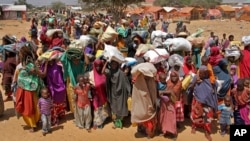A Red Cross report says African countries are failing their internally displaced people. Reversing that trend was the subject of a high level meeting of the International Red Cross and the African Union that wrapped up Tuesday in Zimbabwe.
Africa has about 13 million internally displaced people, a third of the global number of IDPs, and more than double the amount of refugees on the continent.
By definition, refugees flee across a national border, while IDPs leave their homes but stay within their own country.
African Union Commission head of humanitarian affairs, refugees and displaced people Olabisi Dare says the situation of IDPs in Africa is very critical, dire and worsening.
"...The issues that are generating internal displacement [are] multiplying and deepening by the day. One of the key things is that some of the situations are protracted situations. We are talking about displacements in countries like Sudan, Somalia, Democratic Republic [of Congo]. For some time, as a result of dwindling conflicts, the numbers went down. But it went up again because of new situations. Here we are talking about Boko Haram situation, the Sahel situation and the Malian situation,” he says.
Dare spoke to VOA on the sidelines of this week’s meeting in Zimbabwe to look at how African nations can better implement the Kampala Convention.
Created in 2009, the A.U. convention binds governments to protect the rights and wellbeing of IDPs forced to flee their homes because of conflict, violence, disasters and human rights abuses. Just 25 of the 55 AU member states have signed and ratified the convention. Some other countries, like Kenya, that are not signatories, have their own IDP laws.
But in a report this week, the International Committee of the Red Cross says African countries are coming up short on those commitments.
The ICRC presented 25 recommendations for improvements, including dialogue with IDP communities to ensure their meaningful participation in elections and other decision making.
CRC global IDP advisor Angela Cotroneo played a key role in the recent research and consultation with the African Union.
“Internally displaced persons in situations of armed conflicts are the most vulnerable civilians. The ICRC is present in Africa and we work on behalf of persons affected by armed conflicts and other violence and we experience every day, they are difficult, situations of IDPs. Very often, they lack access to essential services such as health care, education, employment. Sometimes, they continue to be concerned about their safety and security,” Cotroneo says.
She said governments need to seek out input from vulnerable groups to ensure their needs are met.
The experts agree African countries must also address the root causes of internal displacement, which in most cases is armed conflict.




